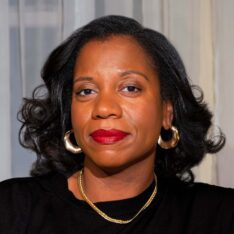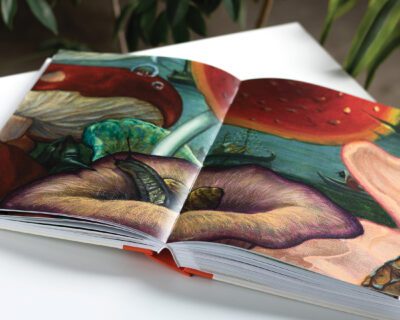Brooklyn Academy of Music by Wally Gobetz is licensed under CC BY-SA 2.0
Gina Duncan looks back on her first year as BAM president
The arts organization’s first Black leader has diversified programming at BAM and strived to make the space more inclusive

Gina Duncan (photo by Rory Mulligan)
Gina Duncan knew she didn’t want to tell football stories forever. She never really meant to tell them in the first place.
“I knew nothing about football, but I learned quickly how to get people, even if they weren’t into football, how to help them find that narrative,” says Duncan.
And yet, after finding herself as an associate producer at NFL Films in college, the Bronx native thrived — and ended up sharing a 2004 Sports Emmy Award for her contribution on HBO’s “Inside the NFL” for her ability to connect niche stories to a bigger audience.
It’s a skill she’s applied consistently since, especially over the past year as Brooklyn Academy of Music’s president — the first Black woman in that role — and BAM’s first vice president of film and strategic programming. Since February 2022, she has focused on increasing Black and brown membership to the arts organization, and under her purview, programming from singer-songwriter Solange Knowles and writer Hanif Abdurraqib as a curators-at-large, in addition to a revival of Lorraine Hansberry’s final drama, have graced BAM’s stages.
But it was at NFL Films in Los Angeles where Duncan first realized she could bring audiences together. Not that she ever intended to work there: NFL Films came to Northwestern University looking for students to join the program. Only, they didn’t want to hire film majors — they wanted to hire people with less relevant experience and more potential. She was essentially drafted.
There, she edited clips at night and worked with agencies such as QuasiWorld Entertainment as a production executive. “It was such a lesson in how to be in an art space that’s really embedded in a community and make itself useful to all people in that community and beyond,” says Duncan.
Black superheroes on film
After college, Duncan returned to New York to ultimately become a film and community programmer at Jacob Burns Film Center in Pleasantville, New York in 2011. Duncan, the child of Jamaican immigrants, wanted to remain close to home and her grandmother, who had Parkinsons. While helping to support her family, she juggled the responsibilities of producing TV, film, and theater for artists including Titus Kaphar, Ja’Tovia Gary, and comedian Mike Birbilglia.
Then Brooklyn came calling. In January of 2017, Duncan joined BAM’s executive team in a newly created role as associate vice president for film. There, she oversaw the organization’s film program, including BAM Rose Cinemas, with a deliberate focus on boosting underrepresented voices in cinema. She spearheaded initiatives like BAM’s “Women Filmmakers in the New Hollywood Era” series, and “Black Superheroes on Film.”
“It’s one thing to do something in Pleasantville. Another to do it in Brooklyn,” she says. “Part of what I did was really look at the role that BAM had in the community and its 161-year history, but also really look at what the promise of the film program was. When BAM opened the film program in 1998, the whole point of it was to actually connect with the Black and brown audiences in Brooklyn … but it soon started to move away. I wanted to go back to that.”
Nora Ann Wallace, chairwoman of BAM’s board, credits Duncan’s experience in Pleasantville and background in arts-centered community programming as crucial to her ability to thrive here.
“Gina is a gifted strategist who excels at assessing the bigger picture,” she told the New York Times last year. “Her ability to inspire a group of people — be it staff, audience, donors, or our board — is vital to this moment in BAM’s history.”
A promotion in 2019 expanded Duncan’s role to include oversight of the BAM’s archives and other programming, including lectures, classes and discussions. And when the pandemic hit, she moved more of the organization’s offerings online.
The Criterion Collection’s curatorial director Ashley Clark worked under Duncan from July 2017 to the end of 2020 and can testify to her ability to increase engagement wherever she goes.
“It was the first time I’d had a Black woman as a boss,” he says, “We’re both Jamaican. There was a moment when we stood in the office together — we were the two most senior people in the office — and we were talking about this film ‘Babylon’ and whether it needed patois subtitles. I stood and thought, ‘Hang on; this is a special moment because the two of us are here running the show for the film department.’ It was very special to have Gina who’s just this trailblazing Black woman as a boss.”
Duncan briefly left BAM to take on the producing director role at Sundance at possibly the worst time in history for people who like going to movies: months into the outbreak of the pandemic. Duncan produced the festival online and took charge of fiscal and artistic planning throughout the pandemic.
Like a good neighbor
After about a year-and-a-half in Park City, Duncan received the news that BAM was in search of a new president. Since her return — and as BAM has been able to offer a full slate of programming again — the organization has gained new members and seen higher engagement across the board demographically. She’s supported longstanding initiatives to get the older Black community involved, for example, through gospel brunches, screening series, senior dance parties, and Black Santa for Christmas parties.
“If you look through BAM’s archive, there are moments in history in which folks in Brooklyn have demanded a president that looked like them,” Duncan says. “There were petitions in the ‘50s, ‘60s, to the ‘80s. It’s 2023, and I’m here. One of the big reasons I could even get my foot in the door was because of the disruption we had with the pandemic and then the uprisings around Groege Floyd’s murder.”
She promoted the fact that members can join BAM for free with an IDNYC identification card, even if undocumented or unable to afford the membership fees. Members with IDNYC can also buy discounted $5 film tickets. Duncan created the “pay what you can afford” membership option, boosting the membership numbers across the board, including among Black, brown and undocumented audiences, not to mention folks who just couldn’t afford full membership, according to BAM, which did not provide specific numbers.
Up next at BAM, in addition to Knowles’ curatorship: Author Zadie Smith’s debut play “The Wife of Willesden,” which opened April 1; “The Cry of My People,” an evening of music featuring pianist-composer Archie Shepp and an evening of classic and recent works by the Alvin Ailey American Dance Theater in June.
“I’m not coming to this as someone who is steeped in the performing arts, but I am coming to it as someone who really understands the importance of an arts institution in a neighborhood and how to present great work,” Duncan says. “ A lot of times with art institutions, there is a tension between community programming and artistic excellence. I don’t see that tension. Those two are one and they can be together.”
You might also like 


























